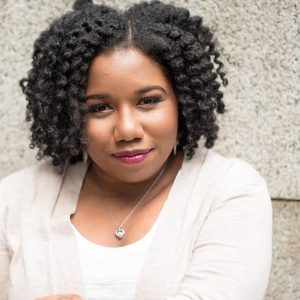It’s rare to have a guest interview here at Pub Rants. I am delighted to welcome Viniyanka Prasad to the blog. I’ve known her for years. She has something awesome cookin’ here in the Mile-Hi city, so I’m shining the spotlight on her and The Word, a nonprofit Denver-based writing sanctuary for diverse voices. This terrific organization launched in 2016 and their first programs became available in 2017, and now Viniyanka is launching a new conference called [margins.] this summer. This is a welcome addition to the Denver scene, so welcome, Viniyanka!
You are the founder and executive director of The Word. Tell us when the organization launched and what is your missiYou are the founder and executive director of The Word. Tell us about your mission.
Hello and thank you so much having me to share more about The Word! In a whirlwind few years, we’ve had the privilege to offer dozens of workshops, mentorships, submissions opportunities, and reader events.
We fight for equity and celebrate storytelling from marginalized communities. In the ideal literary world, there is equal access to resources that amplify stories and equal freedom to share with the creator’s own vision.
You are launching a new conference called [margins.] in 2020. Tell us about this conference. What should readers know about how they can participate in various capacities?
The [margins.] conference (August 1-2) is a space for community and craft building that places writers from the margins at the center. We’ll be talking writing craft, publishing know-how, and literary activism.
The strength of a space like [margins.] is in its ability to build lasting connection, even in our new 2020 virtual setting. So, it’s not just an array of pre-recorded sessions for consumption.
We’re creating small group gatherings, one-on-one feedback opportunities, and community roundtables so that attendees will walk away with writing/publishing tools as well as a new family to look to for support.
Our celebration is for everyone in a number of ways! We’ll be hosting a public virtual bookfair with readings and titles everyone will want to explore. We’re already hosting a series of discussions that are free and open to the public, so please join in throughout the next month!
We also invite potential presenters and publishers who would like to submit titles or presenters to reach out. Finally, everyone can be a part of supporting this vision during our Kickstarter which has just a short time left to meet our goal—that’s also a place to build community, for example with our virtual book club offering! More information can be found here, and our continually updated list of programs and speakers is here.
Why is it important to provide safe spaces for marginalized voices to be heard both by each other and by the world?
Writing from the margins often means explaining the need for your story to be told, the need for greater representation. It is an exhausting way to exist in literary spaces. When a wide range of writers from across marginalized backgrounds gather, everyone can show up as themselves—no majority within which you do not fit. And when we remove the need to explain why we are here, we get to actually do the things that brought us: find our strongest voices, brainstorm the best ways to represent our communities while sharing our truths, and learn how to navigate healthy writing careers.
Creating this space shows our communities, and everyone, what a literary world that embraces a variety of perspectives can be. The incomparable poet and activist Suzi Q. Smith, also [margins.] co-organizer, reminds us often that we have to imagine ourselves in the future we want before we can build the future that we need. With [margins.] we get to do one better: we get to make that future a micro-reality right now.
What would you like to tell agents who are looking for #ownvoices clients? What do agents need to learn most?
A very welcome question, and an agent who is asking this is asking the best one. To answer this thoroughly would probably require an entire conference itself, and certainly a range of voices other than mine (another project for us one of these days)! With hopes of being helpful here, I’ll focus on an important and core consideration: the agent’s questions about their own identity.
In any space where equity and inclusion are challenges, each of us brings our own vulnerabilities, which, yes, come with defenses. To be truly open to other perspectives, we need to clear out our own junk by acknowledging our own internal tapestries of challenges and privileges. It helps us trust in another person’s “unimaginable” experience without feeling that it erases what we each have lived. It helps us balance our gut connection with a humble openness to artforms that we haven’t been primed to understand.
To any agent whose first reaction is skepticism to that suggestion, I ask you a question: is it possible that your skepticism is a defense?
What are the greatest challenges facing writers from marginalized communities today?
I think it’s important to make room in our minds for the universe of interrelated complexities that contribute. From not seeing enough of ourselves in literature so that we internalize the idea that we do not belong, to not having the soft inroads that exist because of insularity that has been perpetuated over time, to the repeated experience of manuscripts reaching publishers who do not know what to do with them. I could go on, and that is why The Word has to engage readers, writers and the publishing industry with its work.
I think at the moment there is a real danger in the idea that publishing is progressing due to “diversity” trending. We’ve been here before; this is not the first time in publishing history with a push for diversity-focused acquisitions or hiring initiatives. We are repeating ourselves because victory was declared based on limited, short-term gains.
I also believe that we are in a place of unique momentum. To harness that for lasting change, the literary world needs to shift from initiatives to a vision for sustained practice. We also need to continually be aware of the risks for tokenization along this path.
What is your greatest hope for the future of diversity and representation in storytelling and publishing?
Complete equity is the utopian goal we should always stubbornly demand, but I’ll also offer up an interim goal.
Right now, with so little representation, each book from a marginalized writer carries something close to all the hopes and pain for all the people who have ever felt unheard. One book should be that—one story thoughtfully and lovingly created. This weight stacked upon writers from the margins, to heal every hurt within their communities, is of course an impossible one. It will absolutely continue to limit which stories are shared.
So, my hope is that we do more than just invite new storytellers to the table. My hope is that the literary community acknowledges the unhealed wounds caused by underrepresentation, a first step toward an effective balm. I hope we then see the old table as just that, and trust that there is something better to be built together.





